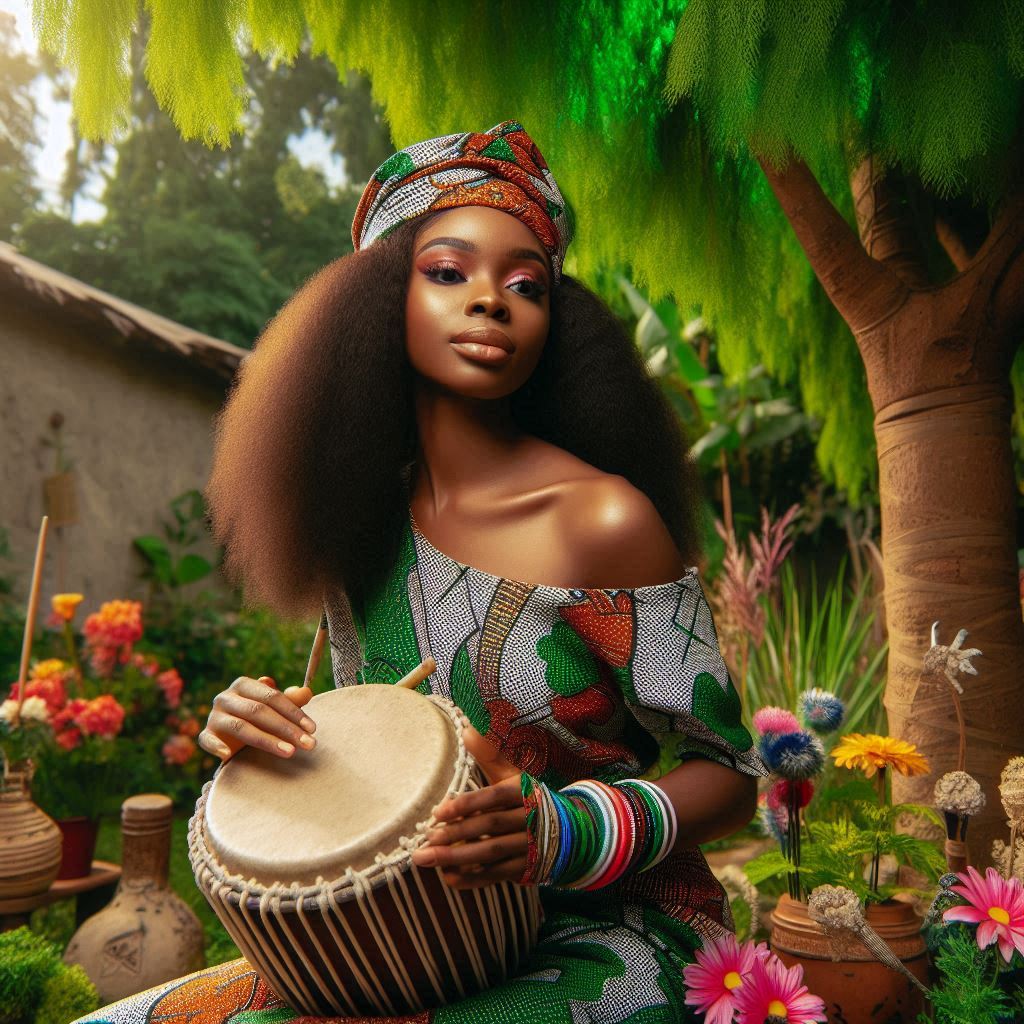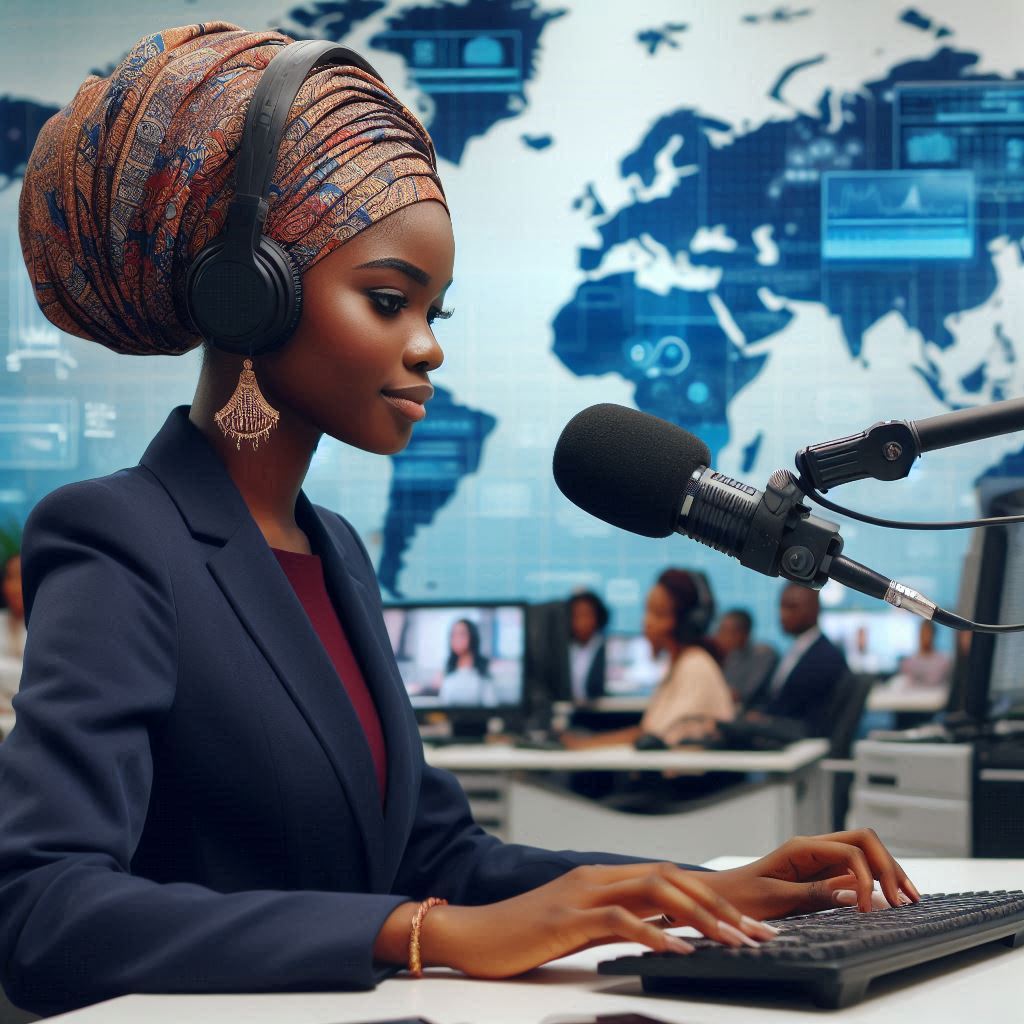Introduction
Nigeria, a vibrant and diverse country, boasts a rich tapestry of artistic traditions.
From intricate beadwork and captivating masquerades to vibrant textiles and expressive dances, Nigerian arts capture the essence of its multifaceted culture.
Each art form tells a story, reflecting the diverse ethnicities and histories within the nation.
These artistic expressions are not just cultural artifacts; they are living, breathing embodiments of Nigerian identity and heritage.
Brief Overview of Nigerian Artistic Traditions
Nigerian art is as diverse as its people. Traditional arts include elaborate sculptures, vibrant paintings, and intricate crafts. The Nok civilization, one of Nigeria’s earliest, created terracotta sculptures that still fascinate historians and art lovers.
The Ife and Benin kingdoms are renowned for their bronze and ivory carvings, reflecting their advanced craftsmanship and aesthetic sensibilities.
Yoruba, Igbo, and Hausa traditions also contribute significantly, each offering unique artistic perspectives and styles.
These traditions are preserved and passed down through generations, keeping the cultural heritage alive.
Importance of Literature in Nigerian Culture
Literature holds a paramount place in Nigerian culture. It serves as a mirror reflecting society’s complexities, struggles, and triumphs. Nigerian writers like Chinua Achebe and Wole Soyinka have gained international acclaim for their profound works.
Achebe’s “Things Fall Apart” and Soyinka’s plays and poetry explore themes of colonialism, identity, and resistance.
Nigerian literature also includes oral traditions like folktales, proverbs, and epic poetry, which convey wisdom and values across generations.
Through literature, Nigerians articulate their experiences, dreams, and challenges, fostering a deep sense of identity and continuity.
Significance of Exploring Nigerian Arts through Literature
Exploring Nigerian arts through literature offers a unique and enriching perspective. Literature provides context and narrative to the visual and performing arts, enhancing our understanding.
For instance, Achebe’s novels often describe traditional ceremonies, dances, and artifacts, offering insights into their significance and symbolism.
Similarly, Soyinka’s plays vividly portray Yoruba rituals and festivals, immersing readers in the cultural milieu.
Through literature, we can appreciate the interconnectedness of various art forms and their roles in Nigerian society.
Moreover, literature amplifies the voices of Nigerian artists, allowing their stories to reach a global audience.
It bridges the gap between past and present, highlighting the evolution of artistic traditions. By reading Nigerian literature, we not only experience the beauty of the arts but also grasp the socio-political contexts that shape them.
This holistic understanding fosters greater appreciation and respect for Nigerian culture.
In fact, Nigerian arts and literature are deeply intertwined, each enriching the other.
By exploring Nigerian arts through literature, we gain a profound appreciation for the nation’s cultural heritage.
This journey through words and images reveals the soul of Nigeria, celebrating its diversity, creativity, and resilience. Through literature, the vibrant spirit of Nigerian arts continues to inspire and captivate the world.
History of Nigerian Literature
Nigerian literature has a rich and diverse history that reflects the country’s cultural heritage and political struggles.
Overview of the Evolution of Literature in Nigeria
Literature in Nigeria dates back to the pre-colonial era, with oral storytelling being the main form of communication.
These stories were passed down through generations and reflected the customs, beliefs, and values of the various ethnic groups in Nigeria.
During the colonial period, Nigerian literature began to take on a more written form, with authors like Amos Tutuola and Chinua Achebe gaining international recognition for their works.
Achebe’s novel “Things Fall Apart” is considered a classic of African literature and has been translated into numerous languages.
In the post-colonial era, Nigerian literature continued to flourish, with writers like Wole Soyinka, Buchi Emecheta, and Chimamanda Ngozi Adichie exploring themes of identity, nationalism, and social change in their works.
These authors have won prestigious literary awards and have helped to bring Nigerian literature to a global audience.
Key Figures in Nigerian Literature
- Chinua Achebe – Known as the “father of modern African literature,” Achebe’s work has had a profound impact on the literary world.
- Wole Soyinka – The first African to win the Nobel Prize in Literature, Soyinka is a playwright, poet, and essayist whose works explore the complexities of Nigerian society.
- Chimamanda Ngozi Adichie – A rising star in the literary world, Adichie’s novels have garnered critical acclaim and have been adapted into films and TV series.
Influence of Colonialism and Post-Colonialism on Nigerian Literature
Colonialism had a significant impact on Nigerian literature, as it forced writers to grapple with questions of identity, cultural heritage, and the effects of colonization on society.
Many Nigerian authors used their works to critique colonial rule and to advocate for independence and self-determination.
In the post-colonial era, Nigerian literature continued to be shaped by the country’s history of colonialism, as writers explored the legacy of colonization on Nigerian society and culture.
Themes of alienation, marginalization, and resistance are common in post-colonial Nigerian literature, as authors strive to make sense of the country’s complex past and present.
Overall, Nigerian literature is a vibrant and dynamic field that reflects the country’s rich cultural heritage, complex history, and ongoing struggles for social justice and political change.
By exploring Nigerian arts through literature, readers are able to gain a deeper understanding of the country’s diverse voices, traditions, and aspirations.
Read: Psychological Impact of COVID-19 on Nigerians
Themes in Nigerian Literature
Exploring the rich tapestry of Nigerian literature reveals a myriad of themes that are prevalent throughout the works of many Nigerian writers.
These themes not only capture the essence of Nigerian culture but also provide insights into the country’s history, society, and diversity.
Exploration of Common Themes in Nigerian Literature
- Identity: One of the central themes in Nigerian literature is the exploration of identity, both personal and collective. Writers often delve into the complexities of identity in a country with over 250 ethnic groups.
- Colonialism and Post-Colonialism: Nigerian literature frequently grapples with the legacy of colonialism and its impact on the country’s social, political, and cultural landscape. Writers reflect on the struggles of decolonization and nation-building.
- Corruption and Political Instability: Many Nigerian writers use their works to critique the rampant corruption and political instability in the country. Literature becomes a platform for addressing societal ills and advocating for change.
- Gender and Feminism: Gender roles and feminism are recurring themes in Nigerian literature, with writers exploring the challenges faced by women in a patriarchal society. Female writers, in particular, shed light on issues of gender inequality and empowerment.
Representation of Nigerian Culture, History, and Society in Literature
- Cultural Heritage: Nigerian literature is deeply rooted in the country’s rich cultural heritage, showcasing traditions, beliefs, customs, and languages of various ethnic groups. Writers celebrate Nigeria’s diverse cultural tapestry through their works.
- Historical Narratives: Nigerian writers often incorporate historical events, figures, and moments into their storytelling. They offer a glimpse into Nigeria’s past, from pre-colonial times to independence and beyond, shaping a collective historical consciousness.
- Social Realities: Nigerian literature serves as a reflection of the country’s social realities, portraying the struggles, triumphs, and everyday experiences of its people. Writers shed light on issues such as poverty, inequality, urbanization, and modernization.
How Nigerian Literature Reflects the Country’s Diversity
Nigerian literature is a testament to the country’s rich diversity, encompassing myriad voices, perspectives, and narratives that capture the multifaceted nature of Nigerian society.
Through the works of Nigerian writers, readers are exposed to the complexities of a nation marked by ethnic, linguistic, religious, and cultural diversity.
Writers like Chinua Achebe, Chimamanda Ngozi Adichie, Wole Soyinka, and Buchi Emecheta have contributed immensely to showcasing Nigeria’s diversity through their writings.
They blend traditional storytelling techniques with contemporary themes,
creating a vibrant tapestry of narratives that reflect the myriad experiences of Nigerians across different backgrounds and identities.
From the bustling streets of Lagos to the tranquil villages of the Niger Delta,
Nigerian literature transports readers to diverse landscapes and communities, offering a glimpse into the country’s multifaceted identity.
Through vivid descriptions, authentic dialogue, and nuanced characterizations, writers paint a vivid picture of Nigeria’s cultural, historical, and societal richness.
Overall, Nigerian literature serves as a powerful medium for exploring the country’s multifaceted identity, capturing the nuances of its culture, history, and society.
Through the exploration of common themes, representation of Nigerian heritage,
and reflection of diversity, Nigerian writers continue to shape the literary landscape and showcase the vibrancy of Nigerian arts.
Read: Psychology and Counseling Services in Nigerian Schools
Notable Nigerian Authors
Introduction to some of the most prominent Nigerian authors
Nigeria has produced a plethora of talented writers who have made significant contributions to the literary world.
These authors have captured the essence of Nigerian culture, history, and societal issues through their powerful storytelling.
One of the most iconic Nigerian authors is Chinua Achebe, often referred to as the father of modern African literature.
Achebe’s masterpiece, “Things Fall Apart,” is a seminal work that has been translated into numerous languages and has sold millions of copies worldwide.
Through his writing, Achebe shed light on the impact of colonialism on traditional Igbo society, challenging Western narratives and stereotypes about Africa.
Another notable Nigerian author is Chimamanda Ngozi Adichie, known for her critically acclaimed novels such as “Half of a Yellow Sun” and “Americanah.”
Adichie’s writing explores themes of cultural identity, feminism,
and post-colonialism, capturing the complexities of contemporary Nigerian society with nuance and depth.
Her work has garnered international acclaim and has inspired a new generation of African writers to tell their stories.
Wole Soyinka, the first African to win the Nobel Prize in Literature,
is another prominent Nigerian author known for his plays, essays, and poetry.
Soyinka’s works often delve into the political and social upheavals of Nigeria, offering a searing critique of corruption, dictatorship, and injustice.
His powerful voice and unwavering commitment to social justice have solidified his place as one of Africa’s literary giants.
Analysis of their works and contributions to Nigerian literature
Chinua Achebe’s impact on Nigerian literature cannot be overstated.
Through his exploration of Igbo traditions, language, and customs,
Achebe challenged the dominant narratives of African inferiority perpetuated by Western colonial powers.
His writing paved the way for a new generation of African writers to reclaim their cultural heritage and tell their own stories on their own terms.
Chimamanda Ngozi Adichie’s novels have brought Nigerian literature to a global audience,
shedding light on the complexities of post-colonial Nigeria and the diaspora experience.
Her portrayal of strong, independent female characters challenges gender norms and empowers women to assert their voices and agency in a male-dominated society.
Adichie’s work has sparked important conversations about feminism, identity, and representation in literature.
Wole Soyinka’s contributions to Nigerian literature extend beyond his literary works to his activism and advocacy for human rights and democracy.
Soyinka’s plays, such as “Death and the King’s Horseman” and “A Dance of the Forests,”
explore the tensions between tradition and modernity, power and resistance, in Nigerian society.
His outspoken criticism of political corruption and authoritarianism has made him a thorn in the side of oppressive regimes,
earning him the respect and admiration of readers around the world.
Impact of Nigerian authors on the global literary scene
Nigerian authors have had a profound impact on the global literary scene,
challenging stereotypes, exposing social injustices, and celebrating the rich diversity of African cultures.
Through their works, writers like Chinua Achebe, Chimamanda Ngozi Adichie,
and Wole Soyinka have broadened the horizons of readers worldwide, offering new perspectives and insights into the human experience.
The international success of Nigerian authors has not only elevated the visibility of African literature but has also inspired a new wave of diverse voices from the continent and its diaspora.
Their stories resonate with readers from different backgrounds,
fostering empathy, understanding, and a shared sense of humanity across borders.
Nigerian authors continue to shape the literary landscape, pushing boundaries,
challenging conventions, and amplifying marginalized voices in the global conversation.
Basically, Nigerian authors have made remarkable contributions to the world of literature,
enriching our understanding of Nigerian culture, history, and society.
Their works inspire, provoke, and illuminate, inviting readers to explore the complexities of the human experience and the enduring power of storytelling.
As we delve into the works of these notable authors, we embark on a journey of discovery and enlightenment, guided by the voices of Nigeria’s literary giants.
Read: How Nigerian Schools Address Student Psychology

Delve into the Subject: Internship Opportunities in International Politics Nigeria
Gain More Insights: Economics Internship Opportunities in Nigeria
See Related Content: Practical Training in Criminology Programs Nigeria
Learn More: Criminology Student Experiences in Nigeria
See Related Content: Photography: Top Nigerian Photographers
Popular Literary Works in Nigeria
Nigeria, as a country rich in culture and history, has produced numerous literary works that have gained recognition both locally and internationally.
From novels to poems to plays, Nigerian literature showcases the diverse talent and creativity of its writers.
Overview of Popular Nigerian Books, Poems, and Plays
Some of the most popular literary works in Nigeria include
- Chinua Achebe’s “Things Fall Apart” – a novel that explores pre-colonial life in Nigeria and the impact of colonization on traditional societies.
- Wole Soyinka’s “Death and the King’s Horseman” – a play that delves into concepts of power, duty, and sacrifice in Yoruba culture.
- Chimamanda Ngozi Adichie’s “Half of a Yellow Sun” – a novel set during the Nigerian Civil War, depicting the impact of the conflict on different individuals.
- Buchi Emecheta’s “The Joys of Motherhood” – a novel that follows the struggles of a Nigerian woman in a patriarchal society.
- Christopher Okigbo’s poetry – known for its deep exploration of themes such as love, politics, and identity in post-colonial Nigeria.
Analysis of the Themes, Characters, and Settings in These Works
These literary works often delve into themes such as
- Identity and cultural heritage
- Colonialism and its effects on society
- Gender roles and struggles
- Political corruption and power dynamics
- Tradition vs. modernity
The characters in these works are typically complex and multifaceted, representing the diversity of Nigerian society.
They grapple with personal dilemmas as well as societal pressures, making them relatable to readers both within and outside Nigeria.
Transform Your Career with Expert Guidance
Get personalized mentorship consulting that’s tailored to your unique path. Our expert advice is actionable and exclusive.
Get StartedMoreover, the settings in these works play a crucial role in shaping the narrative and reflecting the cultural landscape of Nigeria.
From rural villages to urban cities, Nigerian literature captures the essence of different environments,
allowing readers to immerse themselves in the rich tapestry of the country.
The Cultural Significance of These Literary Works in Nigeria
These literary works hold immense cultural significance in Nigeria, serving as a reflection of the country’s history, struggles, and triumphs.
They preserve traditional beliefs and practices while also challenging societal norms and fostering critical dialogue.
Through these works, Nigerian writers have been able to showcase the complexities of their culture to a global audience,
garnering acclaim and recognition for their unique storytelling and literary prowess.
Additionally, these works contribute to the preservation of Nigerian languages and oral traditions, ensuring that future generations have access to their heritage.
Generally, Nigerian literature continues to be a vital medium for exploring the intricacies of Nigerian arts and societal dynamics.
Through its diverse array of literary works,
Nigeria remains at the forefront of cultural expression and creativity, captivating readers worldwide with its rich storytelling tradition.
Read: Understanding Mental Health Laws in Nigeria
Learn More: Famous Nigerian Art Institutes and Galleries
See Related Content: Importance of Music Education in Nigeria
Uncover the Details: Profiles of Pioneering Nigerian Graphic Designers
Challenges and Opportunities in Nigerian Literature
Exploration of Challenges Faced by Nigerian Authors and Writers
Nigerian literature faces several challenges that hinder the growth and recognition of the country’s rich cultural heritage through literary works. Some of the key challenges include:
- Lack of Adequate Funding: Many Nigerian authors struggle to finance their writing projects due to limited access to funding opportunities.
- Infrastructure Deficiency: Poor infrastructure, such as unstable electricity and internet access, makes it difficult for writers to conduct research and connect with a global audience.
- Lack of Publishing Opportunities: The Nigerian publishing industry is relatively small, making it challenging for aspiring authors to find platforms to showcase their work.
- Limited Marketing and Distribution Channels: Nigerian literature often struggles to reach a wider audience due to ineffective marketing and distribution strategies.
- Political and Social Instability: Tensions and unrest in Nigeria can impede the creative expression of writers, leading to censorship and self-censorship.
Opportunities for Growth and Development in Nigerian Literature
Despite the challenges, Nigerian literature also presents various opportunities for growth and development. Some of these opportunities include:
- Cultural Exchange Programs: Collaborations with international literary organizations can enhance the visibility of Nigerian authors and their works on a global scale.
- Digital Publishing Platforms: The rise of digital platforms provides Nigerian writers with new avenues to self-publish their work and reach a broader audience.
- Literary Festivals and Workshops: Participation in local and international literary events can help Nigerian authors network, learn new skills, and gain exposure.
- Literary Awards and Prizes: Recognition through literary awards can boost the profile of Nigerian writers and attract attention to their works.
Analysis of the Role of Technology in Promoting Nigerian Literature
Technology plays a significant role in promoting Nigerian literature by providing authors and writers with the tools and platforms to engage with their audience. Some ways in which technology contributes to the advancement of Nigerian literature include:
- Social Media Marketing: Authors can use social media platforms to promote their books, interact with readers, and build a strong online presence.
- Online Writing Communities: Virtual writing groups and forums offer Nigerian writers the opportunity to connect with peers, share feedback, and improve their craft.
- E-Book Publishing: The availability of e-book publishing platforms enables Nigerian authors to self-publish their work and distribute it globally at minimal cost.
- Digital Archiving: Technology allows for the preservation and dissemination of Nigerian literary heritage, ensuring that future generations have access to these cultural treasures.
In general, while Nigerian literature faces obstacles, there are also promising opportunities for growth and development.
By harnessing the power of technology and embracing collaborative efforts,
Nigerian authors can overcome challenges and continue to enrich the literary landscape with their unique voices and perspectives.
Discover More: Collaborations in the Nigerian Fashion Industry
See Related Content: Islamic Studies Conferences in Nigeria
Conclusion
Summary of Key Points Discussed
Throughout this blog post, we explored the rich tapestry of Nigerian arts through literature.
We started by highlighting the diversity and depth of Nigerian literature, showcasing works from different regions and cultural backgrounds.
Also we delved into the historical context, examining how Nigerian writers have used their craft to reflect and critique societal changes.
We then explored various genres within Nigerian literature,
from traditional folktales to modern novels. Each genre offers unique insights into Nigerian culture and heritage.
We discussed prominent Nigerian authors, such as Chinua Achebe and Chimamanda Ngozi Adichie,
whose works have gained international acclaim. Their stories provide a window into the complexities of Nigerian society.
Furthermore, we examined how literature serves as a tool for cultural preservation.
Nigerian writers document traditions, languages, and historical events, ensuring they are not forgotten.
We also highlighted the role of literature in promoting social change and fostering a deeper understanding of Nigerian identity.
Call to Action for Readers
We encourage you to dive into the world of Nigerian literature. Start with classics like Achebe’s “Things Fall Apart” to gain foundational insights.
Explore contemporary works by authors like Adichie, whose narratives are both engaging and enlightening. Join book clubs or online forums dedicated to Nigerian literature to discuss and share your thoughts with others.
Visit local libraries and bookstores that stock Nigerian literature. Support Nigerian authors by purchasing their books and attending their readings or events.
Engage with the stories and characters, and let them broaden your perspective on Nigerian arts and culture.
Final Thoughts on the Importance of Literature in Preserving Nigerian Culture and Heritage
Literature plays a crucial role in preserving Nigerian culture and heritage. It acts as a repository of knowledge, capturing the essence of traditions, beliefs, and societal norms.
Through literature, we gain a deeper understanding of the past and the present, fostering a sense of continuity and identity.
Nigerian literature also serves as a bridge between generations.
It allows younger Nigerians to connect with their heritage and understand the struggles and triumphs of their ancestors. This connection is vital for maintaining cultural continuity and pride.
Moreover, literature provides a platform for marginalized voices to be heard. It brings attention to social issues, challenges stereotypes, and promotes empathy and understanding.
By engaging with Nigerian literature, readers become more informed and empathetic global citizens.
In closing, exploring Nigerian arts through literature is a rewarding journey. It enriches our understanding of Nigeria’s diverse cultures and histories.
It reminds us of the power of storytelling in preserving our shared heritage. Let us embrace Nigerian literature and celebrate its invaluable contribution to the world of arts and culture.




